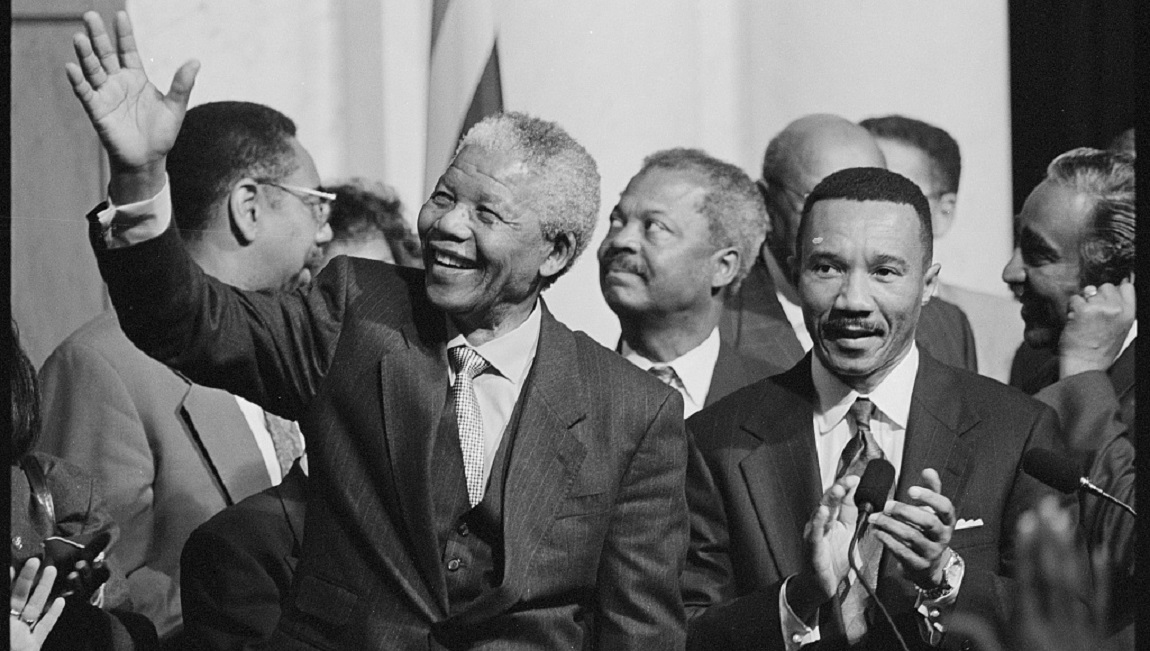On 12 January 1962, seven months before his infamous life sentence that banished him to Robben Island, Nelson Mandela gave a speech at the Pan-African Freedom Movement of East and Central Africa (PAFMECA) conference in Addis Ababa, Ethiopia. This speech was made at a time when the African National Congress (ANC) and the Pan-Africanist Congress (PAC) were completely outlawed by the government. In his speech Mandela not only thanked the four African states that had won its independence, he told of the struggles of Black people in apartheid South Africa, and emphasized the importance of cooperation between African states and liberation movements. The Daily Vox takes a look at four points he made on the power of pan-Africanism.
1. This was one of the first attempts at collaborating the various African liberation movements across the continent to overthrow their imperialist colonisers. For Mandela, this was the beginning of a new stage in the fight. “The extension of the PAFMECA area to South Africa, the heart and core of imperialist reaction, should mark the beginning of a new phase in the drive for the total liberation of Africa – a phase which derives special significance from the entry into PAFMECA of the independent states of Ethiopia, Somalia, and Sudan.”
2. Mandela realised that South Africa and her African people can’t win the fight against the apartheid regime alone. A pan-Africanist approach to the fight was the only way to gain allies in this formidable war. “The view has been expressed in some quarters outside South Africa that, in the special situation obtaining in our country, our people will never win freedom through their own efforts. Those who hold this view point to the formidable apparatus of force and coercion in the hands of the government, to the size of its armies, the fierce suppression of civil liberties, and the persecution of political opponents of the regime. Consequently, in these quarters, we are urged to look for our salvation beyond our borders.”
Mandela had travelled to Ethiopia to work out a plan to speed up the struggle for the liberation of colonised regions that had been bolstered by successful acts of rebellion. “In most of these territories the imperialist forces have been considerably weakened and are unable to resist the demand for freedom and independence – thanks to the powerful blows delivered by the freedom movements.”
3. This speech happened at a time when the four independent African states were making things particularly difficult for the apartheid regime to carry on as usual on the international level. “It is particularly gratifying to note that the four independent African states which are part of this conference, namely, Ethiopia, Somalia, Sudan and Tanganyika [present day Tanzania], are enforcing diplomatic and economic sanctions against South Africa.” Mandela highlighted that it was through an active campaign by the African members states of the Commonwealth (Ghana, Nigeria, and present day Tanzania who had not achieved independence yet) that got South Africa expelled. Nigeria also lobbied to get South Africa expelled from the International Labour Organisation.
“But most significant was the draft resolution tabled at the fifteenth session of the United Nations which called for sanctions against South Africa… Although the United Nations itself has neither expelled nor adopted sanctions against South Africa, many independent African states are in varying degrees enforcing economic and other sanctions against her. This increasing world pressure on South Africa has greatly weakened her international position and given a tremendous impetus to the freedom struggle inside the country.”
4. In his address to the 1962 PAFMECA, Mandela described in great detail how imperialist forces in Africa, especially South Africa, Zimbabwe and Malawi (or the Central African Federation as it was known), Mozambique, and Angola were propping each other up. They trained in each other’s territories, supplied each other with military equipment, and exchanged best practices on how to suppress uprisings. “The clear examples of collective imperialism have made themselves felt more and more in our region by the formation of an unholy alliance between the governments of South Africa, Portugal, and the so-called Central African Federation.”
This, Mandela said, was even more of a reason for Africa to cooperate. “In such a grave situation it is fit and proper that this conference of PAFMECA should sound a clarion call to the struggling peoples in South Africa and other dependent areas, to close ranks, to stand firm as a rock and not allow themselves to be divided by petty political rivalries whilst their countries burn. At this critical moment in the history of struggle, unity amongst our people in South Africa and in the other territories has become as vital as the air we breathe and it should be preserved at all costs.”
Read the full speech here.









